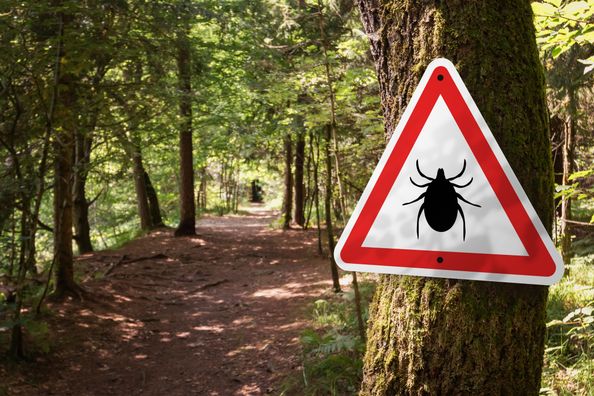Ticks can be more than an annoyance. They can transmit diseases that pose a risk to your health. Dr. Hala Saad, Infectious Disease physician at Quincy Medical Group (QMG), says ticks can be active throughout the year, but their activity levels are generally higher during the warmer months. As we enter the dog days of summer, Dr. Saad offers tips to keep yourself safe this summer.
Ticks are tiny arachnids that can be found in various environments, including wooded areas, grasslands, and even urban parks. These creatures thrive in humid and warm conditions, which vary depending on the tick species and geographic location.
“While ticks are distributed worldwide, certain species are more prevalent in specific regions. For instance, in the United States, the black-legged tick (Ixodes scapularis) and the western black-legged tick (Ixodes pacificus) are commonly found,” Dr. Saad shared.
Although ticks can be active throughout the year, they are generally more active from spring to fall in temperate regions. However, Dr. Saad explains that tick activity may differ based on the climate. In regions with milder winters, ticks may remain active year-round.
It is important to note that not all ticks carry diseases, and not all tick bites result in infection. Nonetheless, it is crucial to exercise caution and take preventive measures to reduce the risk.
“Ticks pose a potential risk to humans and animals as they feed on the blood of their hosts. During this feeding process, ticks can transmit various diseases,” Dr. Saad explained.
Dr Saad says the most well-known tick-borne illness is Lyme disease, caused by the bacterium Borrelia burgdorferi, which is primarily transmitted by black-legged ticks. Other tick-borne diseases include Anaplasmosis, Babesiosis, Rocky Mountain spotted fever, Ehrlichiosis, Tularemia, Powassan virus disease, Colorado tick fever, Tick-borne relapsing fever, and Q fever (caused by the bacterium Coxiella burnetii).
If you find a tick attached to your body, it’s essential to remove it promptly. Dr. Saad says you should follow these steps to safely remove a tick:
- Use fine-tipped tweezers to grasp the tick as close to the skin’s surface as possible.
- Pull upward with steady, even pressure, avoiding twisting or jerking, as this can cause the tick’s mouthparts to break off and remain in the skin.
- After removing the tick, clean the bite area and your hands with rubbing alcohol or soap and water.
- It is advisable to save the tick in a sealed container or plastic bag in case you need to identify it later or consult a healthcare professional if you develop symptoms.
- Monitor the bite area for any signs of infection or unusual symptoms. Seek medical attention promptly if you experience a rash, fever, headache, muscle aches, or any other concerning symptoms following a tick bite.
In this season, Dr. Saad says it’s important to take precautions. To reduce your risk of tick-borne infections, she offers the following tips:
- Avoid tick-infested areas whenever possible, especially tall grasses, densely wooded areas, and brushy areas.
- When venturing into tick-prone areas, wear long-sleeved shirts, long pants, and closed-toe shoes. Tuck your pants into your socks or boots and choose light-colored clothing to help spot ticks more easily.
- Apply insect repellent containing at least 20% DEET (N,N‑diethyl-meta-toluamide) to exposed skin. Alternatively, you can use picaridin or other EPA-approved repellents.
- Conduct regular tick checks on yourself, your family, and your pets after spending time outdoors. Pay close attention to areas such as the scalp, behind the ears, armpits, groin, and the back of the knees.
- Consider treating your clothing and gear with products containing permethrin, which can help repel ticks.
- Create a tick-free zone around your home by maintaining well-groomed lawns, clearing leaf litter, and minimizing tick habitats.
By following these preventive measures, you can enjoy the summer season while protecting yourself and your loved ones from tick-borne diseases. Dr. Saad said with any questions or concerns, you should seek the advice of your primary care provider. To learn more about Infectious Disease services, visit https://quincymedgroup.com/med….
Health Topics:







